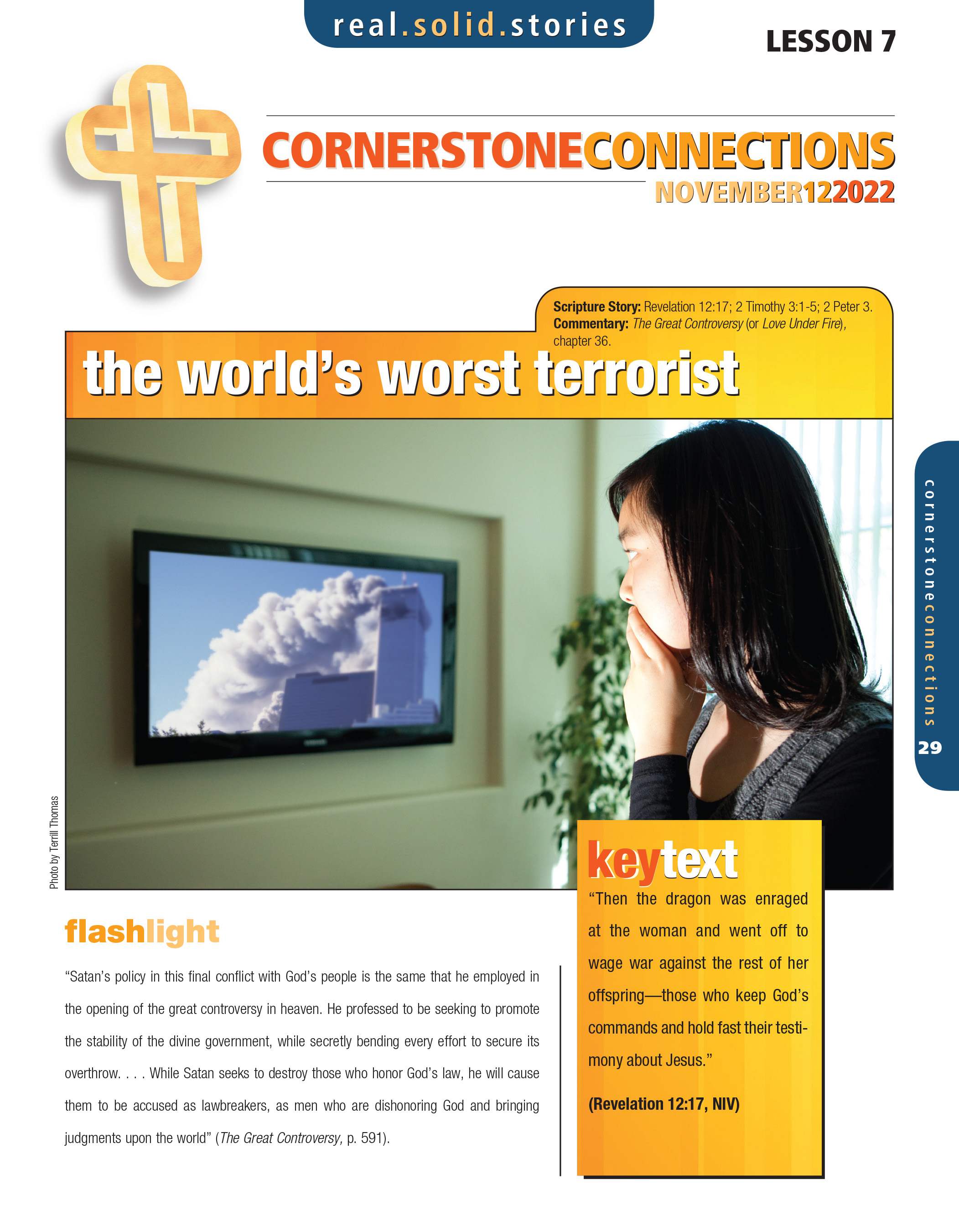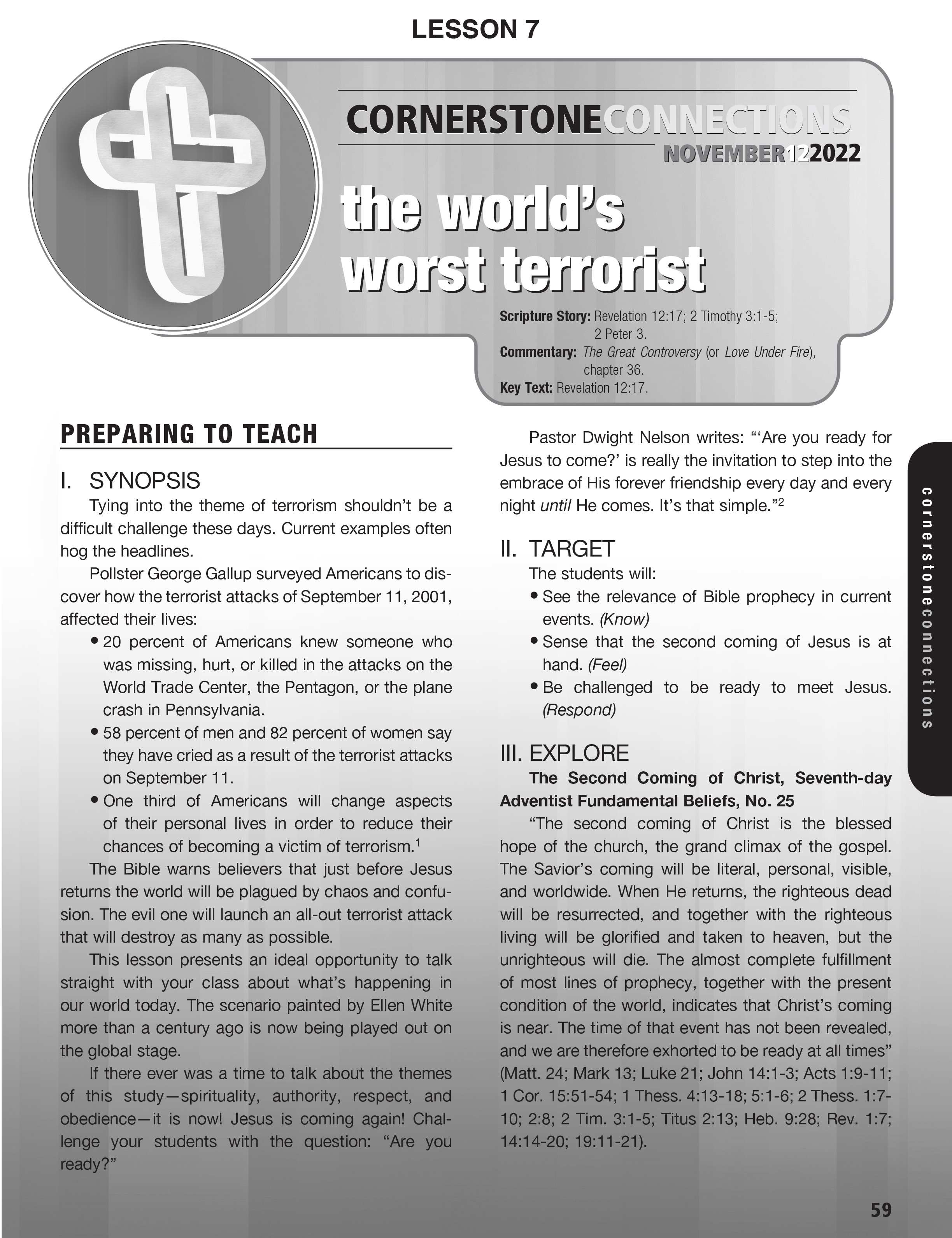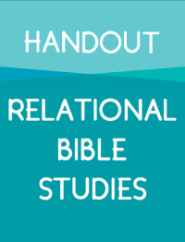"The World's Worst Terrorist"
Click below to download the Cornerstone Connections leader’s guide and student lesson. This week’s resources also include two lesson plans and a discussion starter video which offer different ways of looking at the topic. Each lesson plan includes opening activities, scripture passages, discussion questions, and real-life applications.
Revelation 12:17; 2 Timothy 3:1-5; 2 Peter 3
The evil one has launched an all-out terrorist attack, seeking to destroy as many as possible. Are you prepared for it?
Lesson Plan 1: Jesus—Save us!
SCRIPTURE PASSAGES
OVERVIEW
Media is everywhere. Images are almost instantaneously flashed around the globe. Sometimes those images bring inspiration, but not always. War, rumors of war, famines, plagues, catastrophic weather events, and persecution have almost become the norm. The question might be asked, “Is this a new thing?” The answer is no. As early as Cain and Abel persecution has existed. How did this all get started? Well . . . there was a snake in the garden (Genesis 3), but before that Lucifer caused problems in Heaven (Revelation 12:17). Evil has existed for millennia, but our lesson today will explore how the Lamb deals with the snake.

OPENING ACTIVITY: ALPHABET SOUP
QUESTIONS
TRANSITION
Why does sin exist? What would it be like if the world were perfect? Is this what God really had in mind when He created us? How does sin end? Pull out your Bible, grab your phone/tablet and let’s see what the Bible has to say.
Read John 1:1-5.
In the beginning was the Word, and the Word was with God, and the Word was God. 2 He was with God in the beginning. 3 Through him all things were made; without him nothing was made that has been made. 4 In him was life, and that life was the light of all mankind. 5 The light shines in the darkness, and the darkness has not overcome it.
QUESTIONS
Read 2 Timothy 3:1-5.
But mark this: There will be terrible times in the last days. 2 People will be lovers of themselves, lovers of money, boastful, proud, abusive, disobedient to their parents, ungrateful, unholy, 3 without love, unforgiving, slanderous, without self-control, brutal, not lovers of the good, 4 treacherous, rash, conceited, lovers of pleasure rather than lovers of God—5 having a form of godliness but denying its power. Have nothing to do with such people.
QUESTIONS
Read Revelation 12:7, 17.
7 Then war broke out in heaven. Michael and his angels fought against the dragon, and the dragon and his angels fought back. . .
17 Then the dragon was enraged at the woman and went off to wage war against the rest of her offspring—those who keep God’s commands and hold fast their testimony about Jesus.
QUESTIONS
Read 2 Peter 3:3-7.
3 Above all, you must understand that in the last days scoffers will come, scoffing and following their own evil desires. 4 They will say, “Where is this ‘coming’ he promised? Ever since our ancestors died, everything goes on as it has since the beginning of creation.” 5 But they deliberately forget that long ago by God’s word the heavens came into being and the earth was formed out of water and by water. 6 By these waters also the world of that time was deluged and destroyed. 7 By the same word the present heavens and earth are reserved for fire, being kept for the day of judgment and destruction of the ungodly.
QUESTIONS

APPLICATION
According to scripture, the time of the end isn’t going to be very fun. Evil will rage like a roaring lion seeking who he will devour (1 Peter 5:8). Darkness will be prevalent, and evil will appear to reign. However, God has not abandoned His people. His sacrifice on the Cross has not lost its power, but the darkness is darkest just before dawn. God has won, and the victory is in sight—therefore, Jesus, please come!
FOLLOW UP
Look up in a concordance or www.biblegateway.com the following words: hope, love, second coming, Jesus saves, or redemption. Make a list of key principles in these passages. Write a letter to Jesus expressing your concerns and hopes as you wait for His second coming.

Lesson Plan 2: “Listen Up!” Relational Bible Study
SCRIPTURE PASSAGE
LEADER’S NOTE
For a Relational Bible Study (RBS) you’ll want to get into the Scripture passage and encourage the youth to imagine participating in the story while it’s happening. Then you will be able to better apply it to your own situation today.
You will need to ask God for the Holy Spirit to be present as your small group discusses the questions (no more than 3-6 people in a group is recommended). Start with the opening question. It is a personal question and the answer is unique for each individual. There is no right answer and nobody is an expert here, so don’t be surprised when you hear different responses. You are depending on the Holy Spirit to be present and to speak through your group. Say what God prompts you to say, and listen to what others share.
Take turns reading the chapter out loud. Follow that with giving the students some time to individually mark their responses to the questions (a PDF version of the handout is available as a download). This gives each person a starting point for responding when you start to share as a group. Next, begin the discussion by asking the students to share what they marked and why on each question as you work your way through. Feel free to take more time on some questions than others as discussion warrants.
Encourage each person in the group to apply what is discussed to their personal lives and to share with the group what they believe God wants them to do. Then ask them to pray that God will help each of them to follow through in doing so. Remind them to expect that God will show them ways to live out the message of this passage in the coming week, and that they are free to ask others in the group to help hold them accountable.
OVERVIEW
The end of the world—many people think it will happen. . . someday. But when? Throughout history there have been times of crisis when it seemed the end of the world had come. Indeed, individuals and groups of people have experienced their own end of the world (Nebuchadnezzar, Hitler, the religious leaders who killed Jesus, terrorists who strap themselves to explosives and die as they kill those around them, and active shooters who kill others and then turn their guns on themselves). But when will the end come for the entire world?
The Old Testament speaks about the “Day of the Lord” as the final “Day of Judgment” when everything will be set right by God instead of by humans. Old Testament prophets warned people about this time of reckoning and used it to motivate a change to live a Godly life, especially when people around them were living ungodly lives.
In the New Testament, when Jesus told His disciples about the future destruction of the temple, the disciples considered this would be “the end of the world” (see Matthew 24:3). Jesus described the end of the world as a major event that will occur when He returns a second time in glory and puts an end to sin and suffering. That’s when Christ’s people experience a welcomed face-to-face experience with Jesus Himself. (We won’t get into the millennium and what happens at the start and the end—as well as what happens during the millennium—in this study.)
Later in New Testament times Paul wrote to the younger pastor, Timothy, about practical pastoral concerns. One of these dealt with the anticipated evil in the last days. Paul considered this an indicator that the end of the world was near. Today we’ll look at this description and see if it relates to our current world, and if it relates to us personally.
Listen Up!
What thoughts/feelings come to your mind when you hear “the last days”?
Read 2 Timothy 3:1-5.
1 But mark this: There will be terrible times in the last days. 2 People will be lovers of themselves, lovers of money, boastful, proud, abusive, disobedient to their parents, ungrateful, unholy, 3 without love, unforgiving, slanderous, without self-control, brutal, not lovers of the good, 4 treacherous, rash, conceited, lovers of pleasure rather than lovers of God—5 having a form of godliness but denying its power. Have nothing to do with such people.
1. What things make you think that we’re living in “the last days”?
2. What causes you to disobey your parents?
3. On a scale of 1-5, circle where you are when it comes to:
4. What does having a “form of godliness” (vs. 5) look like?
5. What will make God’s people stand out in the last days?
6. What are you willing to walk away from (vs. 5)?
7. Which is it—external forces or internal forces—that cause you to be either good or bad?
8. How are we to reach ungodly people with the Gospel if we are to “have nothing to do with them” (vs. 5)?
SUMMARY
When parents or teachers are trying to convey something extremely important, they might say, “Pay attention” or “Listen up.” In essence, this was exactly what Paul was saying to young Timothy in the first verse of 2 Timothy 3. Whether you read it as, “But mark this” (NIV), or “You should know this” (NLT), or “But understand this” (ESV), they all come down to saying the same thing. “Pay attention! Listen up! What I have to say is really important.”
What did Paul want Timothy to know? In the last days, things will be terrible! The Great Controversy is between God and Satan, but it definitely involves all of us on earth as well. People lack love for God and others, loving only themselves, money, and pleasure. People disobey their parents, being ungrateful, unforgiving, and boastful—these also play a part in the Great Controversy. Slandering others and lacking self-control—again, part of the controversy. Our behavior indicates on which side of the controversy we stand, God’s side or Satan’s. Ask yourself, or evaluate your actions: “On whose side am I choosing to stand?”

APPLICATION
We focused on just a few verses from 2 Timothy 3, but these give us lots of opportunities to apply Scripture to our lives. Here are four ideas to get you thinking along with the Holy Spirit about how you can live out Scripture’s calling on your life this week. Take one of these or adapt it to your situation at this time. Each of these application options includes a downloadable item to spur the youth to take action.
Paul told Timothy to have nothing to do with people who have a form of godliness but deny its power.
God is not like us. He doesn’t hold grudges against us when we mess up. As a matter of fact, He invites us to come to Him and share that we’ve messed up. And with that, He wipes our slate clean and gives us a new start. That’s right! With God, we get to have do-overs.
Paul truly cared for Timothy and told him to pay close attention to his words. He also told him to look out for certain signs. Whom in your life do you care for deeply? Would you like to put them on notice about things happening now or what might soon come to pass?





